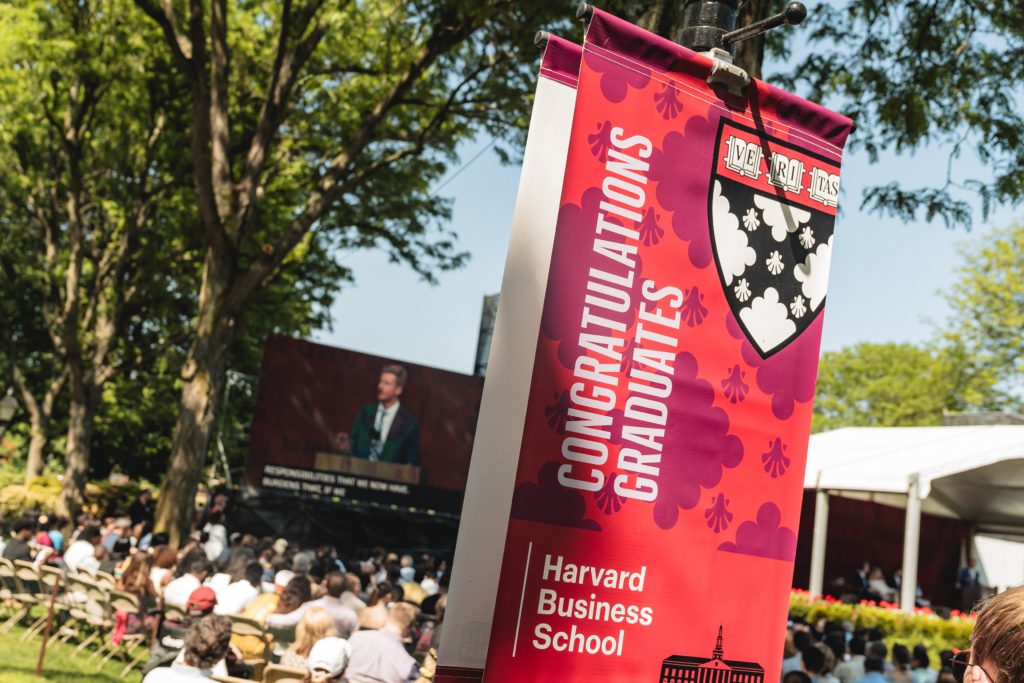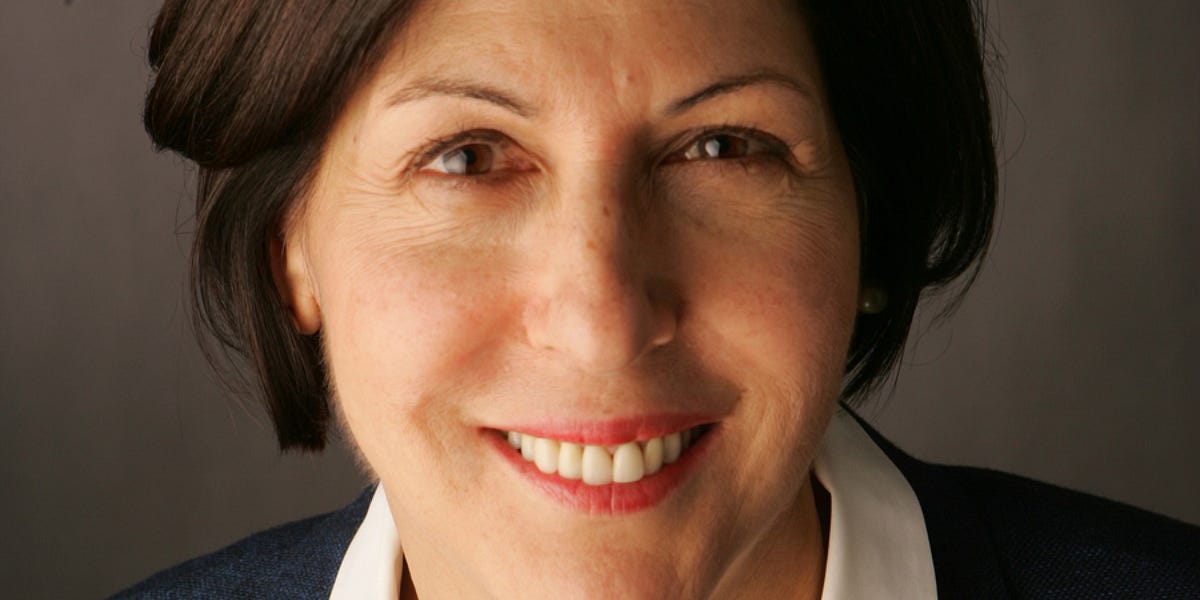Nearly 1/4 Of Job-Seeking Class Of 2024 Harvard MBAs Couldn’t Find Work After Months Of Searching

Hensley Carrasco photo via Harvard Business School
Compensation was once again on the upswing at Harvard Business School in 2024. But that’s not the headline in a terrible year for MBAs on the job hunt.
There’s no sugarcoating it: Nearly one-quarter of job-seeking Harvard MBAs couldn’t find jobs this year, by far the largest portion of a graduating Harvard class to struggle in the market in the last decade — a decade, let’s remember, of widespread economic tribulation and pandemic.
Total compensation for Harvard MBAs rebounded after a one-year decline thanks to a big increase in the median class performance bonus, which Harvard is now calling “variable bonus.” But job offers three months after graduation dropped to 85% and job acceptances fell to 77%, lowest in many years.
MEDIAN PAY INCHES UPWARD; CONSULTING COLLAPSES
2023 was not a cakewalk for Harvard Business School graduates. Ninety-day job offers last year plummeted to 86% from 95% in 2022, and acceptances were down 10 percentage points to 80%. To make matters worse, compensation fell for the second time in three years thanks to fewer grads receiving bonuses. (Poets&Quants calculates compensation by combining base salary and signing and other bonuses and weighting the bonuses by the percentage of those receiving them. B-schools often use different measures to get a compensation number, sometimes simply adding salary and bonuses.)
Looked at through a money lens only, 2024 was a success for Harvard, as comp was up thanks to a big jump in what was formerly known as performance bonus and now is known as variable bonus, from $40K (received by 70% of the Class of 2023) to $47,500 (received by 65% of Class of 2024). With the class median salary flat at $175K and median signing bonus flat at $30K, the jump in variable bonus pushed Harvard’s median pay to $221,800 from $220,100 (see table below for salary, bonus and comp details).
Far more concerning for Harvard is the lack of jobs. Where did they all go? Not away from tech, which was flat at 16% of the class, unusual good news for a top school in a year when tech jobs are imploding amid a multi-year industry collapse. Instead, at HBS, the jobs evaporated from the consulting sector, which saw its biggest drop in at least a decade, to 18% from 25% of the class.
BANKERS & HEDGE FUNDERS MAKE THE MOST, AS USUAL
Harvard does not list the lowest and highest salaries for its graduates, instead preferring to post the median salary at the 25th and 75th percentiles. 2022 was a big year for the school: The highest 75th percentile for financial services was $225K in investment management, $208K in VC, and $200K in PE; for consulting, $175K; and for tech, $185K. The lowest 25th percentile median was government/nonprofit, at $110K.
In 2023, the highs were not quite so high. PE took the prize for highest 75th percentile overall, at $220K, with hedge funders and venture capitalists next at $200K and consultants close behind at $192K. Tech was in the middle of the pack at $172K. The lowest 25th percentile was in “services,” which includes real estate, and by function, business development, management, strategic planning, and marketing, at $112K.
In 2024, the highest 75th percentile in financial services was $200K for private equity, followed by $194K for venture capital. Consultants were at $192K along with investment managers. Tech climbed a bit to $185K. The lowest 25th percentile was nonprofit/government, at $118,500.
Consulting again boasted the high median salary in 2024, at $190K, a shade lower than it was in 2023 ($192K). The lowest median base salary is again for those in nonprofit/government, and it’s the same as last year: $120K. The top field for median signing bonus was investment management/hedge funds and investment banking, both $50K, and the top for variable bonus was investment banking at $175K, with private equity also impressive at $155K. (See details below.)
HARVARD MBS SALARIES BY INDUSTRY 2023-2024
| Industry | % | 25% Base Salary | Base Salary | 75% Base Salary | Median Signing Bonus | Receiving Signing Bonus | Median Variable Bonus | Receiving Variable Bonus | 2023% | 2023 Base Salary | 2023 Median Signing Bonus | 2023 Median Performance Bonus |
| Consulting | 18% | $190K | $190K | $192K | $30K | 90% | $40K | 83% | 25% | $192K | $30K | $32K |
| Technology | 16% | $144K | $165K | $185K | $25K | 43% | $28K | 35% | 16% | $158K | $30K | $22K |
| Private Equity | 19% | $157,500 | $180K | $200K | $31,363 | 35% | $155K | 79% | 17% | $185K | $30K | $181K |
| Venture Capital | 5% | $160K | $177,500 | $194K | $15K | 33% | $42K | 59% | 6% | $175K | $20K | $50K |
| Investment Management/Hedge Fund | 6% | $160K | $177,500 | $192K | $50K | 76% | $90K | 76% | 6% | $175K | $50K | $120K |
| Other Financial Services | 4% | $128,750 | $156,250 | $175K | $35,500 | 57% | $26,700 | 48% | 3% | $176K | $35K | $20K |
| Investment Banking | 5% | $175K | $175K | $185K | $50K | 79% | $175K | 72% | 3% | $175K | $54K | $100K |
| Health Care | 6% | $145K | $165K | $185K | $30K | 66% | $29K | 71% | 5% | $165K | $20K | $24K |
| Consumer Products | 3% | $127,500 | $150K | $155K | $40K | 64% | $30K | 93% | 4% | $140K | $35K | $30K |
| Manufacturing | 5% | $141,250 | $165K | $183,750 | $30K | 50% | $40K | 68% | 6% | $150K | $25K | $26K |
| Nonprofit/Government | 5% | $118,500 | $120K | $120K | NA | NA | NA | NA | 5% | $120K | NA | NA |
| Retail | 2% | $125K | $142K | $157,500 | NA | NA | $24,960 | 73% | 1% | $159K | NA | NA |
| Services | 3% | $140K | $155K | $170K | NA | NA | $40K | 64% | 2% | $140K | NA | $73K |
| Entertainment/Media | 3% | $150K | $165K | $183,800 | $12,500 | 40% | $20,550 | 60% | 1% | $153K | NA | $16K |
| ALL INDUSTRIES | 100% | NA | $175K | NA | $30K | 53% | $47,500 | 65% | 100% | $175K | $30K | $40K |
Source: Harvard Business School
ENTREPRENEURSHIP ALIVE & WELL AT HBS
Thirty percent of Harvard’s 2024 MBAs did not seek employment, highest in the post-pandemic era. Of those, 14% reported the reason was because they were starting own business, a number in line with recent years.
In 2023, 13% of Harvard’s graduating MBA class went to work for a startup company, which Harvard defines as an organization that is still private and 10 years of age or younger. That was down from 14% in the Class of 2022, but up from 12% in 2021, 10% in 2020, and 8% in 2019.
This year, the number joining a startup declined to 12%, with a median starting salary of $160K. Fifty-five percent joined tech firms (up from 43% in 2023), 17% joined healthcare companies (up from 10%), 8% went into manufacturing, and 7% went to financial services firms. Most of the firms — 39% — were in the Northeast, while 32% were in the West. That’s a correction from last year when 53% of Harvard entrepreneurs stayed in the Northeast and just 18% went West.
Harvard tallied 127 founders in its 2023 class, more than half of whom connected with a co-founder at HBS, and more than half of whose companies — 66 — it classifies as “making a social impact.” This year there were even more business creators: 138, 54% of whom had a cofounder, and 46% of whom connected with a cofounder at HBS. Sixty of the startups are businesses making a social impact. Among the new businesses, 32% are in financial services, 32% in tech, and 10% in manufacturing. Half are based in the Northeast, and 13% are in the West.
See Poets&Quants’ story on the Top 100 Most-Funded MBA Startups of 2024.
HARVARD MBA SALARIES BY REGION 2023-2024
| Region | % | 25% Base Salary | Base Salary | 75% Base Salary | Median Signing Bonus | Receiving Signing Bonus | Median Variable Bonus | Receiving Variable Bonus | 2023% | 2023 Base Salary | 2023 Median Signing Bonus | 2023 Median Performance Bonus |
| UNITED STATES | 88% | NA | NA | NA | NA | NA | NA | NA | 89% | $175K | $30K | $40K |
| Northeast US | 49% | $155K | $175K | $192K | $30K | 58% | $47,500 | 65% | 54% | $180K | $30K | $40K |
| West US | 17% | $160K | $180K | $200K | $30K | 41% | $40K | 64% | 16% | $170K | $30K | $30K |
| Mid-Atlantic US | 5% | $155K | $172K | $190K | $30K | 54% | $32,500 | 65% | 3% | $175K | $35K | $30K |
| Southwest US | 6% | $150K | $175K | $192K | $30K | 59% | $61K | 76% | 7% | $190K | $30K | $35K |
| South US | 5% | $150K | $175K | $191K | $30K | 83% | $48,250 | 75% | 5% | $192K | $30K | $34K |
| Midwest US | 6% | $145K | $175K | $192K | $30K | 76% | $44K | 88% | 4% | $188K | $30K | $29K |
| INTERNATIONAL | 12% | NA | NA | NA | NA | NA | NA | NA | 11% | $130K | $33K | $37K |
| Europe | 5% | $117,500 | $135K | $165K | $25K | 28% | $50K | 60% | 5% | $146K | $21K | $78K |
| Asia | 5% | $92,250 | $120K | $171,250 | $25K | 38% | $50K | 63% | 3% | $121K | $40K | $40K |
| Latin America | 1% | $94,412 | $115,441 | $126,750 | NA | NA | NA | NA | NA | NA | NA | NA |
| ME/North Africa | NA | NA | NA | NA | NA | NA | NA | 1% | $140K | NA | NA | |
| ALL | 100% | NA | $175K | NA | $30K | 53% | $47,500 | 65% | 100% | $175K | $30K | $40K |
Source: Harvard Business School
FEWER STICK CLOSE TO CAMPUS
Speaking of the West, Harvard grads have stayed away from there the last couple of years. Overall, little has changed year to year about the geographic breakdown of Harvard MBAs, except slightly fewer stayed in the Northeast this year compared to 2023, and some key regions became less lucrative to move to.
In 2023, 54% of Harvard’s graduating class found work in the Northeast, up from 47% in 2022. This year was closer to 2022, with 49% staying in the Northeast, where the median base salary dropped to $175K from $180K. Meanwhile 17% went West (up from 16% last year but down from 24% in 2022), where the median grew to $180K from $170K. The West also boasted the highest 75th percentile at $200K. The lower was for the 1% of the class that relocated to Latin America: $126,750. (See above for details.)
The South, Southwest, and Midwest all lost significant ground in median base salary between 2023 and 2024.
HARVARD MBA EMPLOYMENT BY INDUSTRY 2014-2024
| Industry | 2024 | 2023 | 2022 | 2021 | 2020 | 2019 | 2018 | 2017 | 2016 | 2015 | 2014 |
| Consulting | 18% | 25% | 26% | 23% | 24% | 21 | 25% | 23% | 25 | 24% | 23% |
| Consumer Products | 3% | 4% | 3% | 3% | 3% | 3 | 3% | 4% | 3 | 3% | 5% |
| Entertainment / Media | 3% | 1% | 3% | 3% | 2% | 3 | 4% | 3% | 3 | 2% | 3% |
| FINANCIAL SERVICES | 39% | 35% | 34% | 35% | 34% | 29 | 29% | 31% | 28 | 31% | 33% |
| Investment Banking | 5% | 3% | 3% | 4% | 3% | 3 | 6% | 5% | 5 | 5% | 5% |
| Investment Management / Hedge Fund | 6% | 6% | 8% | 8% | 7% | 4 | 6% | 6% | 9 | 9% | 10% |
| Other Financial Services | 4% | 3% | 1% | 2% | 1% | 1 | 2% | 1% | 2 | 2% | 3% |
| Venture Capital / Private Equity | 24% | 23% | 22% | 21% | 22% | 20 | 15% | 18% | 13 | 14% | 15% |
| HEALTHCARE | 6% | 5% | 5% | 6% | 7% | 7 | 6% | 7% | 8 | 6% | 5% |
| Biomed / Pharmaceutical | NA | 2% | 2% | 4% | 3% | 2 | 3% | 3% | 3 | 2% | 2% |
| Health-Related Services | NA | 3% | 3% | 2% | 3% | 4 | 3% | 4% | 5 | 3% | 3% |
| MANUFACTURING | 5% | 6% | 5% | 4% | 4% | 7 | 5% | 5% | 5 | 5% | 5% |
| Aero / Auto / Transport Equipment | NA | 2% | 1% | 1% | 1% | 2 | 1% | 1% | |||
| Energy / Extractive Minerals | NA | 2% | 2% | 1% | 2 | 1% | 2 | 1% | 2% | ||
| Highly Diversified | NA | 1% | 2 | 2% | 2% | 1 | 2% | 1% | |||
| Other Manufacturing | NA | 1% | 1% | 1% | |||||||
| NONPROFIT/GOVERNMENT | 5% | 5% | 3% | 3% | 4% | 5 | 2% | 4% | 2 | 4% | 3% |
| Government | NA | 2% | 1% | 1% | 2 | 1% | 2% | 1 | |||
| Nonprofit | NA | 3% | 2% | 2% | 2% | 2 | 1% | 2% | 1 | 3% | 3% |
| Retail | 2% | 1% | 1% | 1% | 3 | 3% | 3% | 2 | 3% | 2% | |
| SERVICES | 3% | 2% | 1% | 3% | 3% | 3 | 3% | 4% | 4 | 2% | 4% |
| Other Services | NA | 1% | 1 | 2 | 2% | ||||||
| Real Estate | NA | 1% | 2% | 3% | 2% | 3% | 4% | 2 | 1% | 2% | |
| Technology | 16% | 16% | 19% | 19% | 19% | 20 | 19% | 16% | 19 | 20% | 17% |
| Consumer Electronics | NA | 1% | 1% | 1 | 1% | 2% | 3 | 2% | 2% | ||
| E-Commerce | NA | 2% | 2% | 2% | 3% | 2 | 4% | 4% | 2 | 3% | 4% |
| Equipment / Hardware / Networking | NA | 0% | 0 | 2 | 1% | ||||||
| Internet Services | NA | 4% | 3% | 6% | 6% | 5 | 5% | 5% | 6 | 7% | 7% |
| Other Technology | NA | 4% | 7% | 4% | 3% | 4 | 2% | 1% | 2 | 1% | |
| Software | NA | 5% | 5% | 6% | 5% | 8 | 6% | 3% | 4 | 5% | 3% |
Source: Harvard Business School
THE PICTURE COMES INTO FOCUS
The flood of late-year employment reports is a good indicator of the tenor of what those reports contain. At this late date (December 21) a handful of high-profile schools still have not released their 2024 data. One M7 school decided to release its report on the weekend before Christmas. Those that have, have shown fairly consistent struggles in placement and pay:
Stanford GSB: Average base salary shrank by 1% to $187,504, average signing bonus dropped by nearly 20% to $33,967, and total compensation was down 3.2%, to $268,490. Job offers at three months dropped to 88% from 89% last year. Acceptances fell from 82% in 2023 to 80% this year.
Northwestern Kellogg: Median salary for Kellogg grads is down $5K, to $170,000, and median overall compensation is down 1.7%, to $197,000. Meanwhile both offers and acceptances for Kellogg MBAs at three months post-graduation were down by 5 percentage points compared to 2023, to 90% and 87%, respectively.
Columbia Business School: The one B-school where offers and accepts at three months increased — offers to 89% from 84% in 2023, and accepts to 86.4% from 81%. But while Columbia MBAs maintained the median base salary of $175,000 that their two predecessor classes reported, and they also reached a median signing bonus of at least $30,000 for a seventh straight year, median other guaranteed compensation dropped to its lowest level since 2013, and that clipped Columbia’s compensation wings a bit. For the second straight year, the school lost ground in total median comp, falling 1.4% to $198,996. Since 2022, total median comp at CBS has dropped just over 2%.
Dartmouth Tuck School of Business: While the class median salary and bonus were flat for a third straight year, at $175K and $30K, respectively, MBAs receiving a bonus grew to 84% from 83% — increasing the total compensation from $199,900 last year to $200,200 this year. Ninety-one percent of the Class of 2024 received offers after 90 days, and 89% accepted, only the second time in 11 years that Tuck grads have failed to reach 95% job offers.
NYU Stern School of Business: Stern Class of 2024 MBAs report an average salary of $166,148, down 1.2% from their predecessors, and an average signing bonus of $37,028, down 4.5%. Total compensation dropped 1.4% to $199,473. Offers at graduation were down nearly 5 percentage points to 80.6%, while offers by three months after graduation (86.1%) were down more than 8 points.
Virginia Darden School of Business: Darden MBAs reported an average base salary of $163,710, down 2.5% from the average reported by their colleagues in the Class of 2023. The school’s average signing bonus also fell this year, by nearly 8%, to $34,562. Class of 2024 job offers at graduation plummeted by nearly 6 percentage points, to 86.5% of the class; acceptances at graduation dropped more than 6 points, to 83.4%. Offers by three months post-grad were down from 95.4% to 92.9%, and acceptances at 90 days were down from 94.2% to 90.1%.
Michigan Ross School of Business: Median starting salaries for Ross MBAs fell by $5,000 to $170,000, and median overall pay for graduates dropped as well, to $195,800, a decline of 3.1%. Just 77.5% of Ross’s latest class reported receiving offers by graduation this spring, down from 90.5% a year earlier. After three months, the overall class offer number had climbed to 84.6%, after six months, more than 90% of Ross MBAs had job offers.
UC-Berkeley Haas: Average base salary for Haas Class of 2024 MBAs was $159,412, down from $162,831 for their predecessors, while the average signing bonus dropped to $34,740 from $36,777. Average total compensation dropped by 2.1% to $184,425 from $188,354. About 86% of the 207 graduates seeking post-graduation employment received offers within three months of graduation, down from 90%, with 84% accepting offers within that window, down from 89%.
Duke Fuqua: Duke MBAs maintained their median salary of $175K and median signing bonus of $30K. Because a larger percentage (87%) of the 340 grads reported receiving a bonus this year, Fuqua actually saw a small increase in its MBAs’ total compensation, to $201,100 from $198,400 last year. But in placement rates Duke took big hits: From 93% of Fuqua MBAs receiving an offer by 90 days post-graduation in 2023 and 92% accepting, to 85% offers and 82% accepts.
DON’T MISS HARVARD HIT HARD BY THE 2023 JOB MARKET: OFFERS, ACCEPTS & TOTAL COMP ALL DECLINE and ANOTHER M7 SCHOOL REPORTS MBA PAY & SALARIES SLIPPING IN 2024: KELLOGG
Related
VIEWPOINT | Don’t want green energy jobs? We’ll take them
“Some may seek to deny or delay the clean energy revolution that’s underway in America, but nobody – nobody – can reverse it. Nobody. Not when so many p
Why honest T-Mobile and Metro reps hate their jobs
As we've been told by a large number of current and former T-Mobile and Metro reps, T-Mobile's harsh goals-oriented system puts pre
Looking for a summer or longer-term job? Here’s how to…
Getting casual work over summer, or a part-time job that you might continue once your tertiary course starts, can be a great way to get workplace experienc












